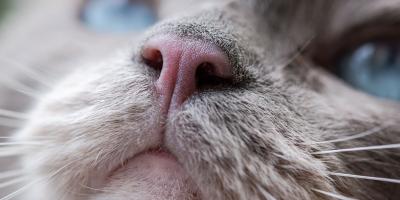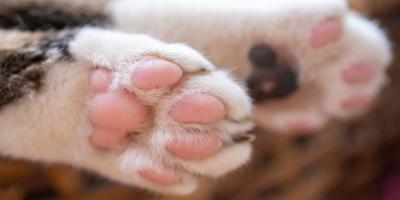Cat Itchy Skin: Why is Your Cat So Itchy?


Itchy skin on cats, also known as pruritis, is among the most common complaints that bring pets to vets. Both dogs and cats can suffer from pruritis or itchy skin, but unfortunately for cats, direct treatment is limited.
The top focus of any treatment is eliminating the cause of the itching. How can you tell what’s causing the pruritis? You and your vet may need to investigate several possible culprits.
Possible Causes for Your Cat’s Itchy Skin
An itchy cat is not a condition, but a sign or symptom of another underlying health concern in your cat. The most common causes of cat itchy skin are:
- Parasites – fleas, mites, and lice
- Infections – bacterial, fungal, and yeast
- Allergies – food, environmental, and contact
There are other skin conditions including autoimmune diseases, cancer and hormonal (i.e., endocrine) diseases, that can lead to itching due to secondary bacterial or yeast infections.
Why is your cat so itchy? Let’s investigate the possible causes.
Parasites
Fleas
Fleas are the first thing to look for if your cat’s skin is itchy. Even indoor-only kitties can get them. You may notice your cat is itching on the back half of his or her body, near the tail. Use a flea comb and gently brush backwards and look for flea dirt. If you see black flecks, that’s evidence of fleas. Your vet will recommend a flea preventative based on your cat’s age, weight, and general health. If you have an itching cat, and no fleas, keep reading.
Mites
Mites are ectoparasitic arachnids that live on a cat’s skin. To check for mites, your vet may take a skin scrape and look under a microscope. Many flea and tick treatments may also get rid of mites, so your vet may suggest that to see if the skin condition improves.
Lice
Lice are tiny, six-legged wingless insects that chew on the skin of their host. The nits, or eggs, will appear as tiny white dots in the hair and skin. Widespread use of flea and tick treatments has made cat lice less prevalent, although lice can be picked up by contact with other infected cats and being in locations with poor hygiene. Your vet will recommend appropriate products for lice control. Lice tend to be specific to one species, so while you need to take care in dealing with your cat’s lice, you should know people rarely get lice from their pets.
With all parasite infestations, be sure to separate the infested cat from other animals in the household, and keep your cat’s bedding, grooming tools, collars, and toys clean by washing in hot, soapy water and treating with appropriate spray until the infestation is controlled.
Infections
Fungal – Ringworm
The medical term for ringworm is Dermatophytosis. Ringworm is fungus that is highly contagious and can spread to humans. Your vet may take a fungal culture and conduct other tests to determine if it’s ringworm, and if so, prescribe oral and/or topical antifungal medicines.
Bacterial
Bacterial infections are often secondary from allergies, parasites, or other infections. If your cat scratches too fiercely and too deeply into the skin, the site can become infected. Depending on the level and type of infection, your vet may prescribe oral, injected, or topical antibiotics in addition to other treatments.
Yeast
Yeast infections in cats are typically secondary to an underlying cause like allergies to the environment or food. The yeast (fungus) most often found is called Malassezia. On the skin, it usually is present in and around the ears (called otitis externa) as well as face, groin, paws, and paw pads. If your cat has itchy ears, you’ll notice your cat scratching and shaking his or her head. There may also be a brown discharge. Once diagnosed, your vet may prescribe oral and topical treatments.
Allergies
Allergies are an inflammatory response to specific substances. When your cat inhales, ingests, or encounters that substance, it causes his or her immune system to overreact, resulting in your cat itching and scratching.
Food
Food allergies in cats are usually caused by proteins, such as chicken, beef, or fish, rather than grains. To determine the offending protein, your vet may recommend a prescription hydrolyzed diet. In a hydrolyzed food, the proteins have been broken down into a very small size, so they do not generate an immune response. The diet is usually fed up to 12 weeks and then your cat’s itch level is assessed.
Environmental
If you and your vet have ruled out parasites, infections, and food allergies, environmental allergens may be the culprit. Cats can have allergic reactions to pollen, dust, and mold, resulting in itchy skin. Limiting your cat’s exposure to those allergens is key along with veterinary management. Switching to a fragrance-free, dust-free, or clay-free cat litter may also help, especially if you see any irritation on your cat’s paws or signs of bronchitis and asthma.
Flea Saliva
Cats can develop an allergic reaction to flea saliva resulting in a hyperimmune response. In addition to flea bites and fleas running through your cat’s coat causing itching, the residual flea saliva creates an allergic reaction with some cats. The treatment will most likely include medicines to relieve the itching and flea preventative medication, because with this allergy, just one flea bite can make your cat itch for two weeks.
Contact Allergies
In the case of contact allergies, cats can become itchy after coming in contact with an irritant or allergen. The reactions can be caused by litter, fabrics, dyes, cleaning materials, plastics, and plants. Once the offending substance is identified and removed, your cat’s itching should be relieved.
How to Soothe Your Cat’s Itchy Skin
Follow your vet’s instructions regarding any oral or topical cat itchy skin treatments. While you may read about home remedies for cat’s itchy skin on the internet, we recommend discussing those treatments with your vet first.
How can you soothe your cat’s itchy skin? Ask your vet if the following methods are appropriate for your cat’s condition.
Bathing
If your cat will tolerate a bath, you can bathe him or her in warm (but not hot) water to wash away scabs, dandruff, environmental allergens, or contact allergens. Do not use human shampoo products. There are shampoos especially for cats that will moisturize the skin and may reduce the itchiness. Your vet may suggest a medicated cat shampoo.
Brushing
How often you brush your cat depends on the length of his or her hair. While hairless cat breeds do not require brushing, longhaired cats typically require daily brushing to help prevent matting, shedding, and hairballs. Cats with short- and medium-length hair will benefit from weekly brushings.
Antihistamines
Some cats have success with allergic reaction by taking some oral antihistamines. Ask your vet which antihistamines are appropriate for cats and the proper dosage.
Cones
A cone (also called an Elizabethan collar or E-collar) or softer donut collar on your cat may prevent excessive scratching and licking, which can often make the condition worse.
Topical Treatments
Any topical treatment should be recommended by your vet. Do not use topical treatments made for humans. Because cats are always grooming themselves, you want to make sure whatever you apply is okay to be ingested by your cat.
Food
If you’ve ruled out an allergy to a food protein and are wondering what to feed your cat with itchy skin, there are options. Consider transitioning your cat to a food rich in omega-3 fatty acids, Vitamin A, and probiotics to support her sensitive skin and stomach.
How to Prevent Itchy Skin
Preventing itchy skin on cats starts with high-quality food and regular grooming to stay on top of skin issues before they become serious.
For flea allergies and infestations, preventative flea and tick treatments can stop the itch-causing parasites from latching on to your kitty. Follow your vet’s advice for using these products.
It is so difficult to watch your cat scratch away from itchy skin. At the first sign of an issue, take your cat to your vet for a proper diagnosis of the condition. Together, you can develop and manage a successful treatment plan that will help make your cat’s skin and coat healthy and shiny.
Want more cat health tips? Get advice from our experts with our other cat health articles.

Form the Perfect Feeding Plan
Related articles

Earn myPurina Rewards with Every Purchase
Use your points for treats, toys, and gift cards with myPurina app.





